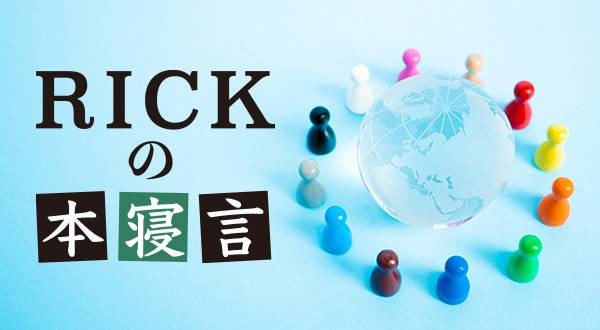Recently, I have to admit that I find that working with young staff is rather boring. There are so many things I want to teach them, have them do, show them, and have them listen to, but I am losing the opportunity to teach them as easily as I did before. Since time is limited, I would like to be able to convey what I want to say quickly, sometimes with a lot of energy, but it is a waste that I am not able to do. Sound House is a company that, since its founding, has always placed a high value on duty and humanity. Therefore, I would like to teach them that philosophy, but I am not sure if there are any staff members who are willing to learn from me. Nowadays, it seems that there is more distance between the young people and me than in the past, but it may be safer to maintain my distance.
I have been thinking about my relationships with younger staff members in the company. Recently, I am often hearing the phrase “be yourself”. The main idea is to emphasize the importance of young people living their own lives and enhancing their own dignity. This is not a bad idea by any means, but for some reason, I can’t help but feel that the original intent of the term is being misunderstood. This is because “be yourself” is sometimes associated with self-centeredness. I fear that this mindset may someday come to mean living as one pleases, and as a result, may lead to disregard for human society and encourage people to live selfishly and self-indulgently. Regardless of whether they are isolated from society in this way or what people say about them, is there anyone who thinks that they should just “be themselves”? For example, there are more and more young people who cannot greet people and the thought of talking to someone new leaves them with disdain. Even if they don’t do such things that are a natural part of life, do they still think that this is a style that is about “being yourself”?
The root of the problem lies in the drastic change in social trends and the breakdown of the family. The ones most affected by these issues seem to be Generation Z, who are frequently highlighted in the media these days. Generation Z is the generation born between the mid-1990s and early 2010s. In other words, as of 2024, this refers to people from junior high school age to those in their 20s. Before that, those born in the 1980s were known as the “Millennial Generation”, which was also called the “Generation Y”. This led to the emergence of Generation Z as the next generation to follow.
Generation Z is characterized as being born and raised in a highly digitalized society. They are accustomed to using cell phones from an early age and gathering all kinds of information from social media, so they tend to know too much about things they don’t need to know about. It has been pointed out that many young people are reading up on tragedies and even posts of dark information, and following the information while suffering from a fear of being left behind. In addition, since this information is floating around 24 hours a day, young people are affected by the mental burden of this information from an early age. It is also necessary to keep an eye on their own information transmission practices, especially via social media. Rather than talking directly to people, their first response is to transmit information. It is an undeniable fact that this can sometimes be taken advantage of and become a breeding ground for crime.
The Economist stated the following comment about Generation Z: “Generation Z is generally serious.They are less likely than older generations to stay up late, drink heavily, or engage in sexual intercourse with strangers. This has a downside. They are less likely to interact with people face to face or have sexual intercourse, and they often complain of loneliness.” As a result of the increased psychological anxiety coinciding with the spread of social networking and cell phones, many scholars have pointed out that depression and anxiety neurosis may now be prevalent in Generation Z. In addition, Generation Z is strongly influenced by the flood of information in the digital society and they tend to value diversity and tend to think in the direction of whatever is possible as a result. Therefore, it is their natural right to live in a way where they can “be yourself”. No matter what kind of life that is.
I am not against “being yourself”. Everyone has the right to live in a way as they see fit, and it is important to live each day enjoying life. Nevertheless, in order to “be yourself", as a member of society, I believe that a certain level of guidelines are necessary. Those guidelines are general social concepts and can be thought of as common sense. It includes social morality and manners. At its base, there was originally the family, which is the base on which society is built. In the relationships nurtured among family members, children grow up, learn how to live, and spread their wings as they become adults, and they are able to adapt and get along as members of society because they have some of the mental foundations to live in a way where they can “be themselves”. There are manners, moderation, and consideration for others, as well as a certain amount of respect for others. If we can respect our parents, we will inevitably be able to look warmly at the elderly. Such feelings should be nurtured in the home.
However, since the Showa era (1926-1989), the breakdown of the family has become more pronounced, and discipline at home has gone as the divorce rate has skyrocketed to the same level as Europe and the United States. The result of divorce not only has caused more single-mother families but also single-father families, and for economic reasons, it has become common for children to be sent to daycare centers and it is not uncommon for relatives to take care of them. The number of fatherless families has thus increased dramatically, and fewer young people have lost the opportunity to interact with their fathers. As a result, many boys are in contact only with their mothers, and it has become difficult for them to avoid feminization. It is not surprising that boys’ hobbies, such as makeup, cooking, and shopping, have followed the same path as that of their mothers.
Even in happy families, the aging population and declining birthrate may cause the children to be spoiled rotten and we sometimes see young people who say that they have never been scolded by their parents. Perhaps they think that not being scolded is a form of love, but the problem is that they lack tolerance to the real world. When they go out to work, they may fail at their jobs. They may even be scolded by their superiors. However, because they have no experience of being scolded, they may be taken aback or hurt by even the slightest quip. It sounds like I am giving you examples of both extremes, but I am writing about what I have actually seen and been made to believe.
Reflecting on the current state of Generation Z, one of the downsides is the failure to develop young people who can negotiate with people from outside companies, especially in terms of work. Negotiations at work can sometimes lead to arguments and heated debates. Sometimes the other party cheats you. Sometimes you get a lousy response. If you do not have the ability to take a firm stance on these issues, to speak for yourself and your company’s views to the other party and get into a debate at times, you will naturally not be able to get the job done. If you don’t make your own arguments, you will be at the mercy of the other party. Negotiations with foreign companies are particularly difficult. Unless you approach negotiations with a strong and consistent attitude, you will often fail to get a good result. I can’t help but think that this is an extremely difficult generation to cultivate the ability to negotiate.
Lately, I have been thinking about how I should engage with younger staff members in the future. The easiest way is to stop being involved. This may be the easiest. If I could just be like many of the leaders in my company and assume that someone else will take care of employee training, it couldn’t be any easier. But apparently, that is not my nature. I get involved in things that I can’t stand to be a part of. I can’t leave something that I feel is not good for me to do as it is, and that is my way to “be yourself”. So what should I do?
There doesn’t seem to be an answer; it is not possible to expect much good from engaging with Generation Z. In fact, the risk of being disliked is much higher. So it seems to me that my own subordinates should be the ones to deal with them, but perhaps their lack of confidence in helping me leads to such an attitude. Is it inevitable? At the end of the day, I am all for living one’s own life, and I am willing to live my own life. However, in order to do so, it is necessary not only to understand social common sense to some extent, but also to have some skills in building human relationships. Human beings cannot live alone. We can only maintain a decent life if we are involved with the people around us and help each other. Keeping this in mind, we can maintain harmony at all costs. Harmony means peace and tranquility, and it can only be achieved through respect for others. We take it for granted that we must respect each other in order to be ourselves. I believe that this is the minimum guideline and that it is important to have an attitude of learning from one another.

































